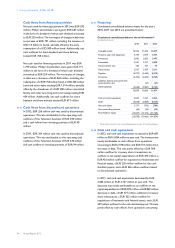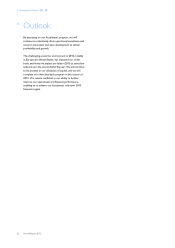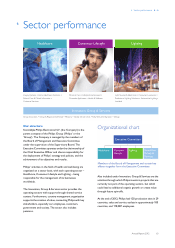Philips 2012 Annual Report Download - page 53
Download and view the complete annual report
Please find page 53 of the 2012 Philips annual report below. You can navigate through the pages in the report by either clicking on the pages listed below, or by using the keyword search tool below to find specific information within the annual report.5 Group performance 5.2.8 - 5.2.10
Annual Report 2012 53
In the United States, the Philips Cares program is a way
for employees to support projects that create healthy,
sustainable communities that contribute to the success
and well-being of future generations. In 2012 alone, some
4,800 employees participated in volunteer opportunities
that suited their needs, schedules, and passions. It is
through Philips Cares and our charitable partnerships
with organizations such as the American Heart
Association and the American Red Cross, that Philips and
its employees are able to improve the quality of life in their
communities today and for tomorrow.
At the end of 2012 we also signed a three year partnership
agreement with the Royal Dutch Football Association
(KNVB) to support their WorldCoaches program by
installing more than 100 solar lighting ‘Light Centers’ in
rural communities throughout Africa and South America.
Working together with local communities and the KNVB,
the Light Centers will provide safe and functional space
for sports and other community activities once the sun
goes down.
5.2.9 Stakeholder engagement
Across all our activities we seek to engage stakeholders
to gain their feedback on specific areas of our business.
Working in partnerships is crucial in delivering on our
vision to make the world healthier and more sustainable
through innovation. An overview of stakeholders is
provided in chapter 14, Sustainability statements, of this
Annual Report.
The Philips Center for Health and Well-being
The Philips Center for Health and Well-being is a
knowledge-sharing forum that provides a focal point to
raise the level of discussion on what matters most to
citizens and communities. The Center brings together
experts for dialogue and debate aimed at overcoming
barriers and identifying possible solutions and meaningful
innovations that can improve people’s lives. It also
facilitates research on a range of health and well-being
topics.
Philips seeks to address key societal issues by developing
solutions relating to Healthcare & Aging, Urbanization and
Access to Energy. The Center was launched in December
2009 and amongst others brings together teams of
multidisciplinary experts from all over the world to
discuss and debate Aging Well, Livable Cities and Mother
and Childcare. Participants include NGOs and Academia,
such as European Patient Forum, ISOCARP, Harvard
School of Public Health, Keio University Tokyo and global
experts on each of the respective subjects.
For more information on the work of the Center, go to
www.philips-thecenter.org.
Working on global issues
In 2012, Philips participated in two major UN
conferences. In June, we contributed to the UN Rio+20
‘sustainable development’ conference in Rio de Janeiro,
where we shared the triple benefits offered by sustainable
solutions, with an emphasis on LED lighting. At Rio+20
The Climate Group launched a report ‘Lighting the Clean
Revolution, the rise of LED lighting and what it means for
cities’. In December we participated in the United Nations
Climate Change Conference in Doha, Qatar. We
partnered with other leading industry players,
governmental organizations, NGOs and several UN
entities. We commissioned a report by Ecofys that
highlighted the real economics of energy efficiency, called
‘The benefits of energy efficiency: why wait?’. The report
highlights the relevance and potential of energy efficiency
to slash energy bills, reduce public budget deficits, reduce
greenhouse gas emissions and stimulate job creation, and
will be used further in public stakeholder engagements.
In November 2012, we organized the Philips Innovation
Experience which was attended by some 1,500 journalists,
customers, scientists, partners and employees. This year’s
theme was ‘Rethinking solutions for tomorrow’s society’
and demonstrated Philips drive for sustainable innovation
to address global challenges like population growth and
urbanization, aging population and rising healthcare costs,
and growing demands for energy and water and food
scarcity.
We firmly believe that these global challenges can only be
addressed through Open Innovation and constructive
dialogue with all stakeholders involved.
5.2.10 Supplier sustainability
More and more, our products are being created and
manufactured in close cooperation with a wide range of
business partners, both in the electronics industry and
other industries. Philips needs suppliers to share our
commitment to sustainability, and not just in the
development and manufacturing of products but also in
the way they conduct their business. We require suppliers
to provide a safe working environment for their workers,
to treat workers with respect, and to work in an
environmentally sound way. Our programs are designed
to engage and support our suppliers on a shared journey
towards continuous improvement in supply chain
sustainability.
























